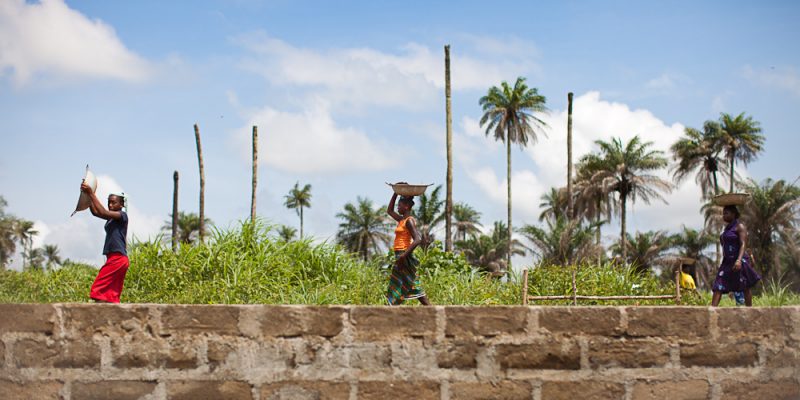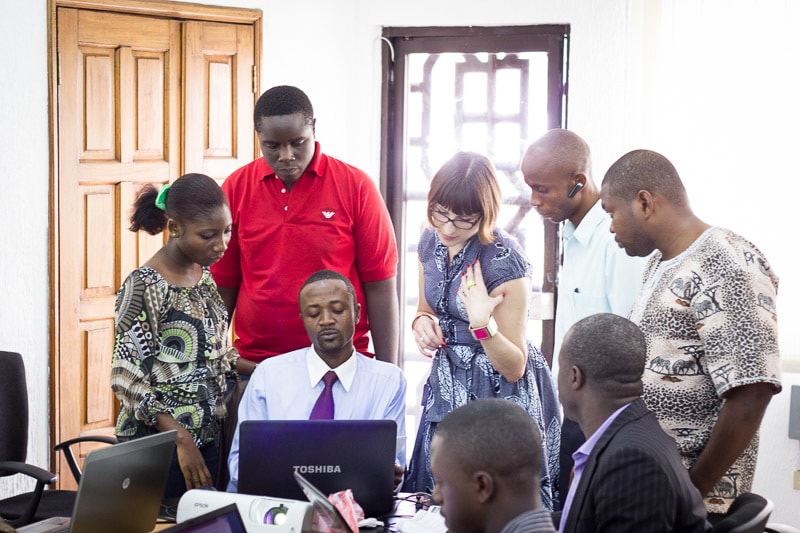The Global Goals as the Super Bowl: Are the 17 Sustainable Development Goals inadvertently tripping up our team?
I’ve recently become interested in American Football. I might still struggle to know the difference between a wildcat and a West Coast offense, but as a European who grew up watching soccer, it’s striking just how complex the tactics can be. The sheer number of diagrammed plays and strategies that are worked out for all manner of possible scenarios is striking. From running to passing plays, including the last-gasp Hail Mary, it is no surprise that National Football League (NFL) teams have, on average, 15 coaches who cover all aspects of the game.
This complexity is in part what drew me to the game. But I was also intrigued because of the similarities I saw with my work, where I have served as an advisor in three developing countries. It also comes on the back of the work of my organisation – the Tony Blair Institute for Global Change. At first glance, it may appear to ‘do development work’, much like any other non-governmental organisation or charity. However, it could not be more different. It supports the development agenda of governments in Africa and beyond. Not the agenda set by the world’s donor community – though we try hard from the government side to align interests and engage where these align.
Like an NFL team, developing countries have an objective to work towards. In the short-term, this may not be the Super Bowl, but it may be making the proverbial playoffs. To get there, the President and their Ministerial team will have hundreds – if not thousands – of strategies and tactics they could deploy. They might start with the education play or the health play. The agriculture play or the trade policy route. The water access game or the conservation game. The counter debt play or the transport route. They can prioritise urban areas over rural areas, or collaborate with one senator or another. Either way, they have the ultimate aim of making a tangible improvement to the livelihoods of their citizens and the prospects of their country.
They will also have an opposing team to deal with. The opposition will have its own offensive strategy for which the government will need a defensive strategy. And their defensive strategy is going to counter the government’s offensive strategy. But in the country context, there is a greater complication. Beyond what stands in front of the team on the field, lie vested interests, lobby groups, the closed door manoeuvring of domestic politicians and the deal making of business elites. Developing countries often have extensive patronage networks, clientelism and entrenched corruption practices more extensive than Deflategate. There is also the limited capacity of ministries and government agencies, major budget constraints, the requirements of international creditors, the weakness of the private sector, inadequate human capital and limited infrastructure. And while these are invisible to spectators, many are also invisible to the President and the team of Ministers themselves, until they suddenly show up on the field just as their team is edging the ball up to the end zone.
With such a pervasive yet hard-to-pin-down opponent, the number of strategies and tactics the Head Coach of the Philadelphia Eagles would have prepared for Super Bowl LII would likely have multiplied.
 The project planning and oversight process, whiteboard version. Credit: Tony Blair Institute for Global Change
The project planning and oversight process, whiteboard version. Credit: Tony Blair Institute for Global Change
How might aid and the Sustainable Development Goals (SDGs) play out in our NFL analogy?
It depends.
Were we to give the Eagle’s Head Coach financial support he might use it to go and buy a better quarterback (although one would argue this may not be possible in the case of Tom Brady). Given some offensive strategy advice, he might factor it in to his game plan, in consultation with his offensive coordinator.
On the other hand, were we to tell the Head Coach that we’re giving him money to buy better players, but the wide receivers must only follow one in ten of his game plays then we would be limiting his strategy options and undermining the teams’ ability to win the game. And if we had to extend this to the center, the quarterback and the running back, because we believe that they play at their best only in ten of one hundred plays, then the team is almost certainly on course for defeat.
The SDGs are rightly ambitious. They can be a tremendously powerful tool to help developing countries to meet developmental aspirations. The impact of aid has been seen throughout history in countries like Germany after World War II, in Israel and in Chile. It has been seen in the battles against HIV and AIDS, polio, malaria and infant mortality. It has also been seen in the number of countries and cities stepping up to turn the course of history in the battle for environmental protection.
But in relative terms these are the low hanging fruit. The SDGs call for us to pick all of the fruit. And never in the history of humankind has the world made anywhere near the amount of progress expected by these goals in such a short period: progress toward no poverty, no hunger, health and education for all, gender equality, clean water and energy access for all, jobs and decent livelihoods for all, no infrastructure gap, sustainable cities and communities, peace and justice across the world and sufficient protection of our planet, both above and below sea level. Fifteen years is no time at all relative to the 200,000 year history of mankind and the 9,000 years since the first civilisation.
To make the kind of progress the SDGs call for requires much more than a global agenda and the setting of targets. They are necessary, but they will not result in a coordinated game plan. Everyone will simply scuttle off to chase their favoured game play.
Supporting counterparts in Liberia to brainstorm for their prioritisation process. Credit: Tony Blair Institute for Global Change
The SDGs need to help with the act of governing, not hinder it.
To stop this happening, improving the ability of local leaders to govern – and hence pick the most suited game plan for each particular situation on the field – and to build state capacity – and hence strengthen the capability of their team – are critical. As it stands, these are largely missing from the way the SDGs are currently pursued.
The ability to govern means allowing local leaders to decide whether to prioritise education over health, infrastructure over police reform, this school over that clinic, this road over that water treatment plant. Teacher payroll over programmes for out of school children. The north of the country over the south of the country. Stronger ties with this neighbour or that neighbour. Relationships with this fellow country leader over that country leader.
Governing also requires taking on the invisible opposition with the tactics and players available to you. This takes various forms. It includes managing the realities of vested interests, lobby groups and political supporters in a way that doesn’t lead to political instability or political failure. In developing countries patronage networks and clientelism are extensive and are not confined to government. Such networks extend throughout all of society, whether government, private sector, civil society or the media. In football, this might manifest as the coaching staff being asked to play the owner’s favourite player or in minor leagues let someone’s son play on the team. These issues will raise difficult discussions. But they cannot be ignored. They must be managed. And deals might have to be made, even if they compromise the game plan.
Then there is the challenge of capacity constraints. Your budget is likely to be so low that you can only afford to pay the salaries of your team, while just managing to keep the stadium lights on. There is no money for transport costs for away games and no money to improve the training facilities. The training facilities are poor, the team bus breaks down every other trip and the quality of team players is low, while you lack the training staff to train them up. You have to design your game plan on this basis, while ensuring that you get results on the field; otherwise fans will want you out. You have to decide whether to spend your limited time focusing on planning today’s game, on training your players for long-term improvement or on fundraising for a new training facility. You simply cannot do it all.
This is the challenge of governing and the extent to which it is done well supports the slow process of state-building. Developing the capability of government, the non-government public sector and the private sector so that they can grow the budget and institutional capacity takes time. But the potential rewards are immense: systems and structures needed for the economy to grow inclusively, the judicial system to strengthen, infrastructure to be built and the education and health sectors to improve. Presidents, Prime Ministers and their Ministers are best placed to govern and through the act of governing, to state-build. If we want them to succeed then we need to make it easier, not harder, for them to make good enough decisions in the context they face.

Building local systems and structures takes time. Credit: Tony Blair Institute for Global Change
Supporting the act of governing requires the international community to accept the trade-offs
Letting local leaders govern and state-build requires significant trade-offs that development organisations driving the implementation of the SDGs – such as international non-governmental organisations, the United Nations, single-issue civil society organisation, bilateral and multilateral aid providers – may be unwilling to make. This is because it requires accepting government’s own prioritisation and its own sequencing. It sometimes requires focusing on just one or two SDGs for five or ten years before coming to the others. It requires taking a genuinely country-led approach – wherein the aid community puts itself in the shoes of government leaders to see their reality rather than a narrow view of picking favourite SDGs and pursuing a strategy that may increase one’s passing yards or number of interceptions, but may be to the detriment of the head coach’s tactics.
This is essentially what is happening when organisations only promote food security, universal health coverage, universal education access or gender equality as an imperative in five to ten years. Instead, we should work with the head coach’s game plan largely as is. This means accepting that some countries will only meet some goals in 50 or 70 years, if not longer. It also means accepting that sometimes you have to work on a ten or twenty year plan to secure a strong quarterback, while in the meantime working with and not undermining the current relatively weak quarterback. And finally, it requires the international aid community coordinating with each other so that they don’t continue to inadvertently restrict the strategies and tactics available to the head coach because they are only seeing one part of the field—as opposed to the whole field and the invisible opposition.
My challenge to those actively working towards global goals – including multilateral and bilateral aid agencies – is whether they are ready to change the incentives within their own organisations and their modalities for providing support to developing countries. Are they ready to make the changes needed to give local leaders the tools they need to succeed?
If deployed strategically to allow progressive and visionary local leaders to succeed in their developmental goals in their own way and on their own timelines, then aid and the SDGs can tip the balance of the game in favour of real progress. For now, given my own experiences as an advisor to several developing country governments, and given my organisation’s work supporting the development agenda of thirteen countries in Africa, I fear the opposition is winning and our Super Bowl dream remains distant.
FEATURED PHOTO CREDIT: Abigail Keenan Editors note: The opinions expressed here by Impakter.com columnists are their own, not those of Impakter.com














